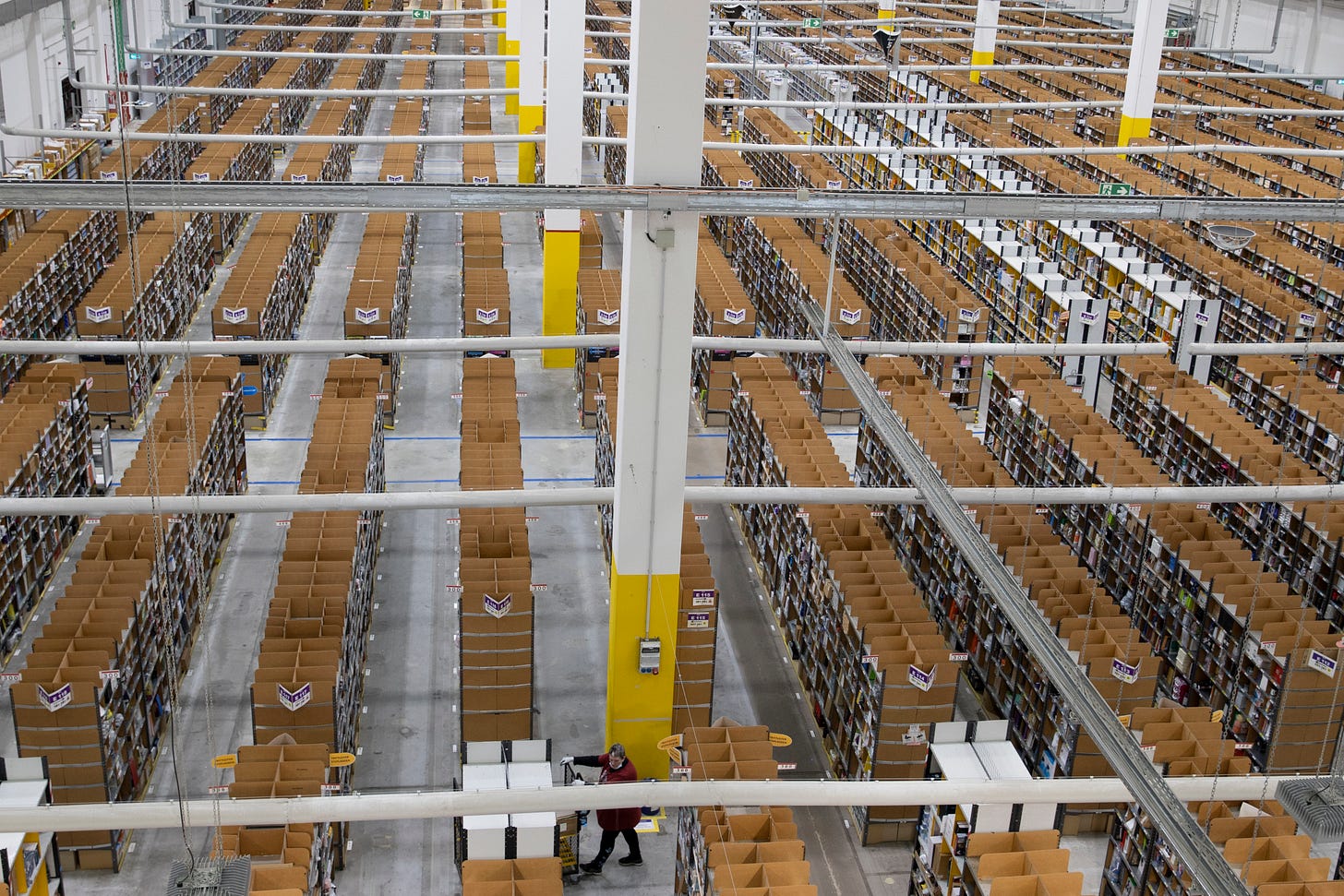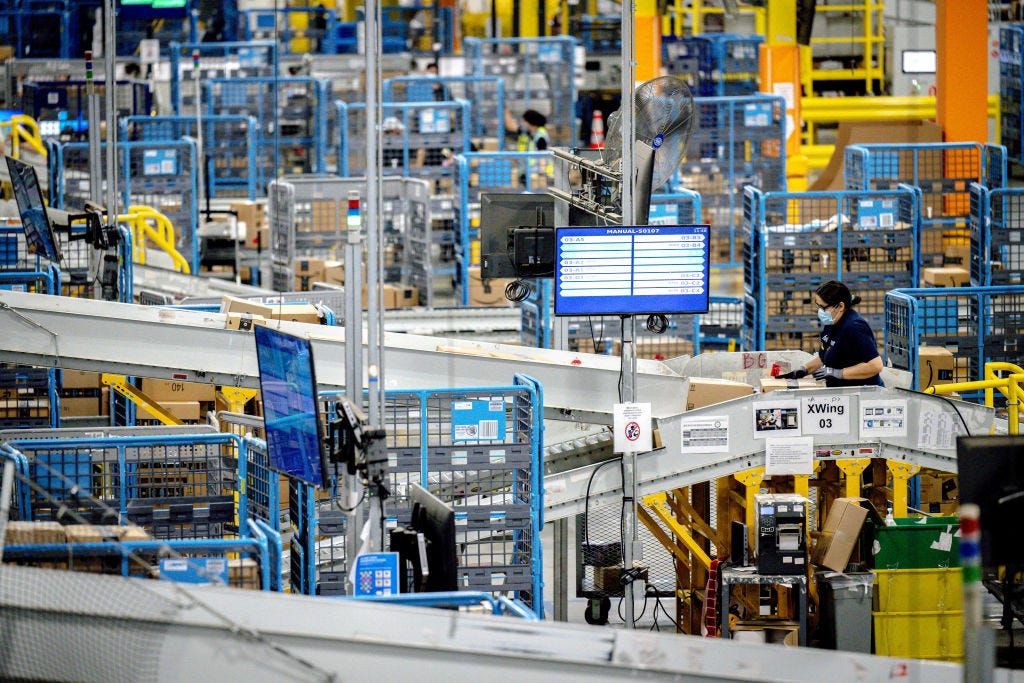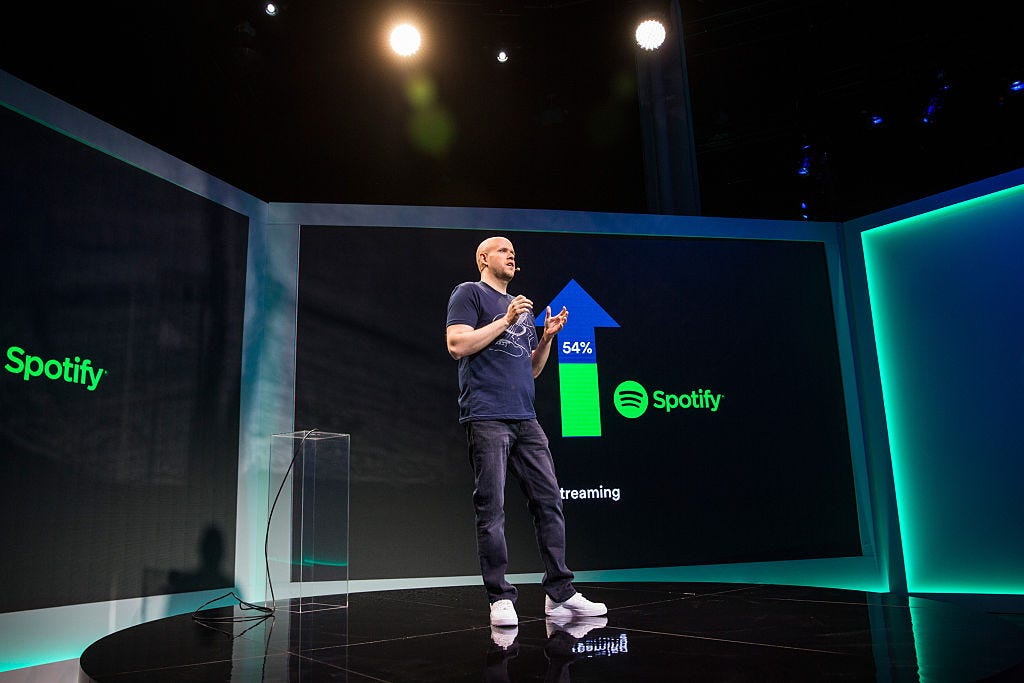It never felt right, but it was my only option
The U.S. has some of the weakest labor protections for temp workers in the developed world
Hello and thank you for reading as always. Earlier this week I sent out a paid piece featuring two great returning contributors. Karen Geier, who previously wrote about the mass graves found in Canada’s residential school system and the country’s continued allegiance to Nazi monuments, as well as its response to Covid, got us up to speed on what is going on with the Canadian “truck convoy” protests.
…So, we’ve made it nice for the Nazis, we’ve fucked up our response to a once in a 100 years pandemic, and the government is “too nice” to tell these total knobs to “fuck off on ice.” Now at the tail end of the coldest month of the year, a bunch of dweebs, fortified by some of the worst sandwiches on earth, made to the tune of “O, Canada!” set off to the nation’s capital under the guise of protesting “vaccine mandates for truckers.”
There’s only one problem with that: Truckers are some of the most highly vaccinated people in the country. The Trucking Alliance estimates about 90% of truckers in Canada are vaccinated because… it’s a condition of entering the United States of America. 90% of Canada’s population live within 200 kilometers of the United States border and most of our goods are imported from our neighbors to the south. This was a non-issue from the start.
Also Rax King wrote on the ten year anniversary of an amazing, beloved, and misunderstood album, Lana Del Rey’s Born to Die. Previously I published an excerpt from her really good recent book Tacky on the band Creed.
I was a stripper then, more than familiar with the hostility of a public that wanted to see only the parts that I was hiding. On the street or at the grocery store, it would be exciting for a woman to be naked. At the strip club, where nudity was humdrum, many men went fracking for a more-naked nudity than was available. The law required me to wear pasties and a G-string, and so certain customers needed to see beneath them. I used a stage name for my own safety, and those same men demanded my real one. Look: how often are you, non-famous and probably not that interesting, your barest and most authentic self? What if your job was to sing in front of a camera or on a stage, with hordes of people scrutinizing your every move, hoping to jam their fingers into a crack in your armor? Could you be that more-naked-than-naked self then?
I have said little about Del Rey’s actual music, ostensibly the thing I love about her. (That thing is certainly not her public self, Jesus Christ. At the very least she’s guilty of putting her foot repeatedly and churlishly in her mouth, at worst of racism and mid-pandemic thoughtlessness.) What is there to say that scores of critics haven’t said better? Well, I’ll try: her voice sounds the way a cup of Valrhona drinking chocolate tastes. Listen to “Video Games” now; it will literally warm you. The arrangements on Born to Die can lack in dynamism, but in standout songs like “Born to Die” and “Radio,” they’re the ideal wall of sound for the Spring Breakers generation. Del Rey made both woozy romanticism and its subsequent nihilism so fun. She dies a lot in those early music videos. She’s abject in them, begging, mewling, crawling, or else so deadpan as to unsettle. The effect is as if the video in The Ring was made by your high school’s most stylish D student.
Here’s a 20% off coupon if you’d like to check those essays out. Thank you for your support. Now let’s get to today’s main thing which is about a report on the state of temporary work in America. After that I checked back in with Max Collins on where the whole Delete Spotify thing stands.
There’s a video you can watch of the last moments of Day Davis’ life. It’s not terribly graphic like some of these videos are in fact you don’t even see him being crushed to death inside of the Bacardi bottling plant in Jacksonville where he had worked for a grand total of ninety minutes. His death is hidden behind all of the machinery.
This was back in 2012 and Davis’ story has been covered a few times since then over the years including in the documentary A Day’s Work and in a ProPublica piece both on the dangers and abuses inherent in temp jobs like his. I was reminded of it again via a report that came out today by groups including Temp Worker Justice and the National Employment Law Project among others. The report begins with the story of Antonia Bannister who is Davis’ surviving younger sister. Like her older brother was and her younger brother is now she too was a temp worker hired by the Remedy Intelligent Staffing agency. Antonia worked for years for the luxury brand Coach in a warehouse where her younger brother also now works. She says was wary of working through the same staffing agency that had sent her older brother into unsafe conditions but as she told the authors of the report “times get hard, and a lot of time it’s only the warehouses and factories, only hiring through temp agencies, that have work readily available when you need it most.”
“It never felt right, but it was my only option,” she said.
That’s become increasingly true for millions of workers around the country and it’s a problem that’s only gotten worse during the pandemic. How many times have I written that exact sentence in here by the way? “The pandemic has only exacerbated things…” Everything that was bad was always bad but now we’ve seen how the bottom can drop even further. We’re on one of those amusement park rides where you stand around waiting for it to plummet and then it does and everyone screams holy shit and then it plummets again.
Case in point: From April 2020 to October 2021 growth in temp work outpaced all other private sector work by 2.5 times according to Bureau of Labor statistics. Meanwhile the staffing industry in America was projected to grow by 16% to $157.4 billion in 2021 according to a U.S. Staffing Industry Forecast. It’s a very lucrative field to be in right now this not-really-hiring people industry. And this being America it’s naturally largely unregulated.
Antonia related circumstances in the warehouse that will sound familiar to anyone who’s worked a temporary job of any kind: Being put into more dangerous positions with less safety training for starters. Lower wages and less opportunity for advancement and no paid time off and no sick leave and no benefits as well. As disposable as the average direct hire hourly wage worker in America is already a temporary worker exists on a level somehow below that. Oftentimes that’s while working for massive brands we all know and use but without even the acknowledgement that they even officially work there by the corporation in question if something goes wrong. Corporations avail themselves of distancing tactics in all sorts of ways to insulate themselves but nowhere is it more blatantly foul than when they get to pretend the people who make their products are just some guy they don’t know anything about. Him? We don’t know him. Go ask the other guy.
The Not My Problem gambit works in many and mysterious ways under capitalism.
The way this all generally goes is like so: A Big Fancy Company will subcontract out the hiring process to a staffing agency like Remedy or one of the many other rapidly growing competitors. They’ll say they’re looking for such and such a number of workers for this period of time and they’ll offer an hourly fee. In exchange for filling these positions the staffing agency will then take a cut of that fee which might range from the merely offensive to the downright repugnant. For example the Big Fancy Company will pay the staffing agency something like $20 an hour per head and the staffing agency will pocket $9 of it and turn around and pay the worker the remaining $11.
There is no other more efficient way to do this.
As a result workers who are contracted through temp agencies end up — and you might want to sit down for this bit of news — getting paid less than direct hire employees.
You also probably won’t be surprised to hear that the greatest fucking country on earth has relatively few regulations about temp work compared to many others. In fact we have “some of the weakest labor protections for temp workers in the developed world” according to ProPublica.
Other countries as they point out “have adopted regulations limiting the length of temp assignments, guaranteeing equal pay for equal work and restricting companies from hiring temps for hazardous tasks.”
“The U.S. lags way behind other industrialized nations in regulating temp work, Maya Pinto one of the authors of the report told the Guardian today. “That lack of regulation has left an opening for the largest employers in the U.S. and sectors like warehousing, manufacturing, and increasingly in retail, to use temporary agencies to squeeze more from workers.”
This opens the door for all manner of ways of fucking over workers and again remember we’re talking about even more so than the traditionally employed worker is already always fucked over.
Wage theft is of course a big problem.
Of the workers surveyed for their report — including those sent by staffing agencies to Amazon and Walmart and Google and Tyson Foods — 24% reported that while temping they had been the victim of wage theft. That either came in the form of being paid sub-minimum wage or being robbed of the over time they worked or even the regular working hours they were owed.
Many others complained of being kept in an involuntary part-time position. You probably know this trick yourself even from smaller companies. How they’ll keep you hovering just under fulltime in order to avoid treating you like An Official Employee thereby avoiding owing you benefits and so on.
You might say well ok sure but maybe this is all just as the job title says a “temporary” thing and these people are working on a sort of probationary basis and then they’ll get hired later right? Of course that’s not how it’s going to work if the employers have the opportunity to keep scraping the margins at the expense of labor and there’s an opportunity to set up a profitable toll both for rapacious middle men. 35% of the temp workers they surveyed said they’d been in their current position for over a year. 18% said it had been over two years. I suppose we could get into a philosophical debate about the true meaning of the concept of temporality here but come on man.
AND HERE’S A REALLY FUCKED UP PART I HAD NEVER EVEN REALLY DREAMED OF AS BEING POSSIBLE HOO BOY. Apparently even if some of the host companies wanted to hire on one of the temp workers as a full time employee they can’t because there might be “bondage fees” and “no-poach” clauses baked into the contract with some staffing agencies. Bondage fees. Jesus fucking Christ. Look at this:
Contracts between host employers and staffing agencies can perpetuate “permatemping” and block temp workers from transitioning into permanent, direct-hire positions. Some contracts contain “no-poach” clauses, which prohibit host employers from hiring temp workers as permanent employees during the length of the assignment and for some time afterwards. Others contain “conversion fee” or “bondage fee” clauses, which require a host employer to pay an often substantial fee if it hires a temp worker as a permanent employee. No-poach and conversion/bondage fee clauses deter host employers from hiring temp workers into permanent positions and lock workers into second-tier, temporary work.
A participant in the TWJ Survey Series wrote that she had struggled to earn a living for years as a temp worker in food services in California. She was thrilled when a business where she was placed as a temp banquet server “expressed interest in hiring me as a full-time employee.” But then the staffing agency swooped in and demanded a prohibitive conversion/bondage fee. “The agency’s ‘Placement Specialist’ told [the business] that it would cost $5,000 to buy out my contract with the agency, which, of course, was outrageous and the offer was retracted,” she wrote.
It’s not like they can just speak up either and demand something different. 71% said they experienced some form of retaliation from management for bringing these issues up. It’s hard enough to do so when you actually work at a place right? Now add in the extra step of being employed by some other company unrelated to the one you’re actually laboring for.
On the brightside 80% of them said they had an interest in joining a group like a union to improve conditions which is great for sure but then again when workers do begin unionization efforts at companies like these it’s often the temp staffing agencies in question the companies go to to find replacement workers. It’s all an ouroboros of shit.
The report concludes with a series of policy demands and suggestions for organizing remedies workers can initiate themselves as well some promising legislation that would address a lot of these issues which I encourage you to read here and talk about with anyone and everyone.
Now for a somewhat different kind of labor dispute. You may have seen a number of musicians agitating about the pitiful amount they are paid per stream by Spotify of late. It’s a discussion that has been going on for years but was joined again in earnest after Neil Young left the service. To catch up on what’s been going on I called up my pal and Twitter jabroni Max Collins of Eve 6.


I know you’ve been talking to a bunch of newspapers lately about the Delete Spotify thing. What’s the general thrust of the effort?
As I'm sure you know, at first it was centered around Neil Young leaving and the Joe Rogan thing, and the surrounding culture war stuff around that. The thrust that we and the union of musicians and a growing collective of artists are trying to push through the news is the artist labor side of this. Spotify has been in the business of doing the most flagrant artist exploitation since well before they cut Joe Rogan his first $100 million check. This is the story that is in fact more compelling and interesting. So that’s what we’re sounding off about ad nauseam. Just really to get to people in the most simple, almost reductive terms, stating exactly what Spotify does, how they operate, how they pay, how major labels have ownership of Spotify and all those companies are profiting multiple times off the work of the artists who built the platform while the artists get virtually nothing.
What do you want Spotify to do?
The demands of the musicians union are asking for a penny per stream from Spotify. We’re asking for the backdoor deals they made with major record companies that are still hidden from public view be made public. And we now have the critical mass for a boycott. Spotify is losing money and people are getting on board with this and more journalists are starting to tell the artist side and people are receptive to it.
I did a tweet the other day sort of at the beginning of all this where I was like I’m fairly pessimistic about real systemic change in the music business happening, but I’m optimistic we can give Spotify and their shareholders a really bad month. Now the bad month thing is happening, but I’m more optimistic about the former now. In large part because journalists are clamoring to tell the story, which isn’t something I thought would happen. Since then I did two interviews with the Washington Post, one about Spotify, one about the NFT thing. I talked to the Guardian and Rolling Stone and wrote an op-ed for Spin with Speedy Ortiz. Business Insider ran a piece today. Fortune. This is gaining momentum and the story’s got legs cause it’s interesting and it’s fucking gnarly. People see these stark facts, they see the numbers, and they're incredulous. They’re aghast and they should be.

Is there any such thing as ethical streaming though? God I love Neil Young, but then he turned around and recommended people use Amazon.
Dude. We’ve been calling him out for that. Neil, god bless his heart of gold, is an old rich lib. I respect that his central issue is the Rogan and Covid disinfo thing, that hits close to home for him, he had polio as kid, and I don’t mean to diminish that too much, but I also think it's important we drag him a bit because he’s shilling for a corporation that brings Spotify’s wrongs to a whole other scale, orders of magnitude worse, with worker exploitation and the rest. So that was not the move.
Are there any ethical streaming platforms? I think for our cause right now we’re just trying to keep the message as simple as possible because people want to get stuck in the weeds here and rationalize their own inaction by making things complicated. So we’re just saying use any other platform besides Amazon and Spotify. Most other platforms pay better. Napster is at the top of the list.
I didn’t even know Napster was still around.
I didn’t either. Apparently it’s another company that just bought the name Napster? They pay best, Tidal is up at the top, Apple is right below them. There’s a co-op streaming platform that’s brand new called Resonate I haven’t looked into enough yet, but they’re artist owned and operated. They’re starting to get a little notice. But for the purposes of this boycott, we’re in the business of hurting Spotify as much as possible. They are the household name in streaming. They’ve had a stranglehold on streaming for far too long. If we cause them enough pain and cause their shareholders and CEO to suffer enough we just might be able to wrestle fair pay out of these fucking ghouls. That’s where we’re at right now.
You get something like a million streams a month now?
We’ve been averaging over a million. This last month it was 1.3 million streams. There’s a couple things here: That’s an insane amount of listens. An insane amount of listens to not get paid for, and for a band like ours. I think that’s part of it. Spotify’s algorithms favor the familiar. There are all of these playlists that have a lot of followers that are like 90s playlists, whatever decade, genre, so when people make the argument that Spotify is helping new artists be discovered, well, ok, I’m sure streaming technology in general does that and I can see how you'd make that argument. At the same time they are creating more competition from older shit like us for newer artists. Nostalgia is a potent fucking drug. For a new artist and a new song to get attention when people can listen to — and not just can but are being incentivised to listen to — stuff they're familiar with, that’s how you get a band like Eve 6 with a million streams a month in 2022. I don’t think that’s good for culture. For the human heart.
You’d happily be more irrelevant if you had your way in other words. But then again you certainly do like to do a lot of press.
Haha, well what I'd like is to be fairly compensated for our shit. I’d like that for me and for all artists. That’s what we’re trying to do here.
What do you make from Spotify?
The breakdowns get really complicated. I think that’s part of how Spotify manufactures consent for their payout system. Making it so complicated. They pay out $.003 per stream. The lion’s share goes to the company or person that owns the master recording. This is all part of the deals they made with record labels so labels would be the main profiteers, as well as getting ownership in Spotify. The master owner in our case is Sony who own a piece of Spotify. 10% of the $.003 gets paid out to publishing (the songwriter). It would be illegal for them to not pay out to publishing. It’s not something they’re doing out of virtue. It’s such an absurd amount. I don’t know what it adds up to but it’s basically jack shit.









some quick math: all these years later sony is clearing $3,900/month from eve 6 spotify streams, while the songwriter is receiving $390/month. multiply that by however many bands sony has chained to them.
reminds me of an article i read the other day re: neoliberalism being the root of pretty much every problem we're facing as a society. said article contained this powerful little truth and as simple as it is, it has been rattling around my dome ever since: "Rent is another term for unearned income."
it goes on to state that, "the past four decades have been characterised by a transfer of wealth not only from the poor to the rich, but within the ranks of the wealthy: from those who make their money by producing new goods or services to those who make their money by controlling existing assets and harvesting rent, interest or capital gains. Earned income has been supplanted by unearned income."
but "rent is another word for unearned income" pretty much says it all.
the article for reference (it's old, from 2016): https://www.theguardian.com/books/2016/apr/15/neoliberalism-ideology-problem-george-monbiot